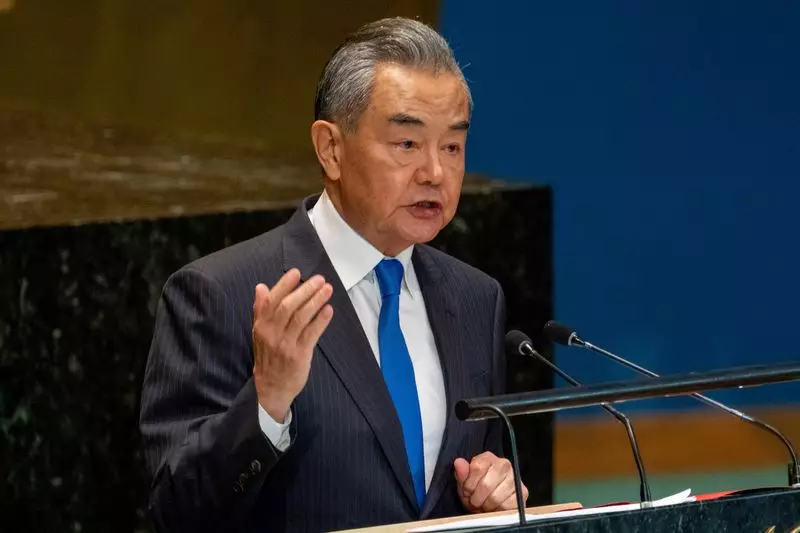As the world’s geopolitical dynamics shift, China’s annual diplomatic endeavor to Africa, initiated by Foreign Minister Wang Yi, underscores a long-standing commitment that now spans over three decades. This New Year tour marks not just the continuity of a tradition, but also reflects China’s strategy to deepen its influence on a continent rich in resources and potential while the attention of Western powers wanes. The backdrop of an evolving political landscape, with the anticipated return of a polarized U.S. administration and ongoing European struggles, provides fertile ground for China to solidify its partnerships across Africa.
Wang Yi’s itinerary includes stops in Namibia, the Republic of Congo, Chad, and Nigeria. These selections are not haphazard; rather, they showcase China’s calculated approach to engage with nations that play pivotal roles in the continent’s socio-economic and geopolitical framework. Analysts emphasize the significance of these visits, highlighting how they represent China’s consistent commitment compared to the sporadic involvement of Western nations.
In light of an economic slowdown, China is actively seeking to bolster trade with Africa. The continent holds promise as a market for exports, particularly in areas where surplus capacity exists, such as electric vehicles and solar technology. Moreover, China’s state-owned enterprises are keen to penetrate infrastructure markets that have stalled due to rising local debts. As local governments hesitate to invest in development, Chinese firms hope to fill the void with much-needed support and resources.
Wang Yi’s visit comes at a time when China’s financial assistance to Africa is expected to increase. The recent pledge of $51 billion made during the previous year’s summit stands testament to Beijing’s intention to strengthen economic bonds. This assistance is not merely philanthropic; it is part of a broader strategy to create sustainable synergies that benefit both sides, enhancing China’s influence while addressing pressing developmental challenges faced by African nations.
For China, establishing robust ties with Africa extends beyond mere economic engagement. It is well understood that Africa’s substantial voting bloc in international institutions, such as the United Nations, could be leveraged to further China’s geopolitical ambitions. Political support from African nations is critical as China seeks to reshape global governance to better reflect its interests, especially concerning issues like human rights and economic sovereignty.
The contrast with U.S. involvement in Africa is stark. President Joe Biden has limited his engagement in sub-Saharan Africa to a solitary visit during his administration, while China has made Africa a priority in its foreign policy calendar. This disparity signals a shift in influence that could redefine Africa’s role on the global stage. As highlighted by industry experts, candidates vying for leadership roles in the African Union are intentionally echoing the benefits of a partnership with China, recognizing its potential to bolster manufacturing capabilities and improve educational outcomes across the continent.
Wang Yi’s decision to include Chad in his itinerary signals China’s strategic interest in addressing regional security challenges. In light of the recent withdrawal of French military forces from Chad, the country’s role as a co-chair in the Forum on China-Africa Cooperation (FOCAC) is becoming increasingly significant. Security cooperation is an emergent facet of China’s involvement in Africa, indicating a shift towards a more holistic partnership that encompasses not only economic support but also collaborative efforts in peacekeeping and stability.
As China expands its presence in regions fraught with instability, the aim appears twofold: to secure its investment interests and to position itself as a reliable ally for African nations grappling with security threats. Analysts argue that this could be an essential factor in securing further agreements and fostering trust with local governments.
China’s New Year diplomacy in Africa signifies much more than seasonal goodwill; it represents a strategic initiative to reinforce deep-rooted partnerships in a region rich with opportunity. While Western interests appear to diminish, China’s commitment to Africa continues to grow, addressing both economic and security needs. This multifaceted engagement promises to reshape not only the continent’s development trajectory but also the geopolitical landscape, establishing China as a central player in Africa’s future. As China embarks on this journey of renewal in its African relationships, the potential for transformative partnerships remains vast, promising a new phase in the history of Sino-African ties.

